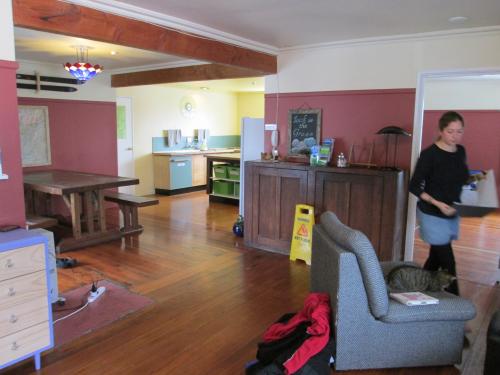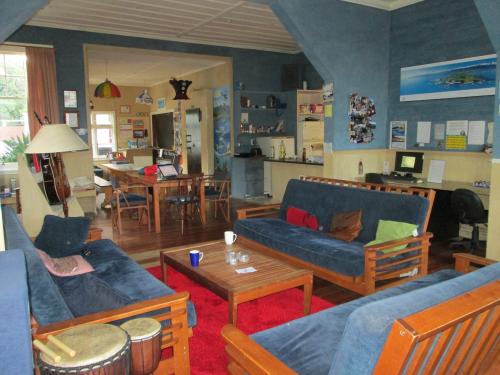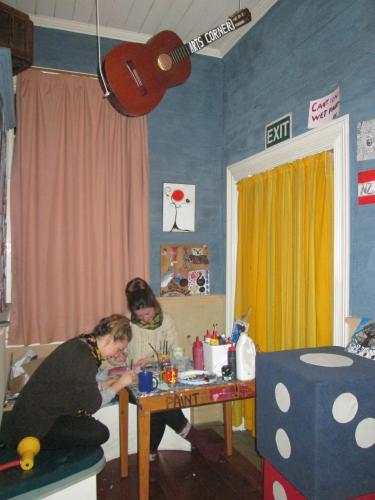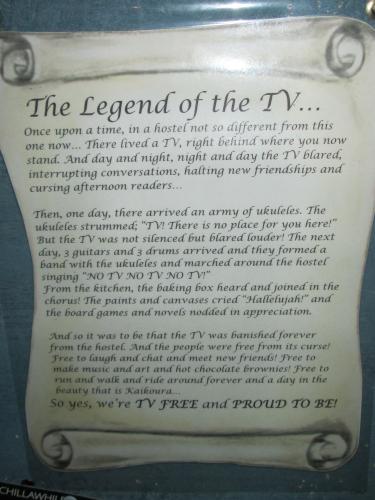Backpackers in 2013: The only people who will travel half way around the world to experience other people and cultures be on Facebook. Likely while sitting next to someone from another country, who is watching YouTube. Eish. It's becoming an unfortunate reality of backpacking, begging the question "What can be done?" Well, a lot.
This past week I stayed at two different hostels that were absolutely wonderful for creating community. The first was Jack in the Green Backpackers in Hanmer Springs. I sat down to dinner with the owner Arne and a handful of staff and guests. The usual 'Where are you from, what do you do?" intros quickly morphed into a discussion and debate on everything from education and religion to regional myths and fairytales. I sat there thinking, "I haven't had a truly great hostel conversation like this in awhile." It reminded me why I love traveling and connecting with people, yet making me wonder why these interactions seem to be happening less frequently.
The obvious answer is technology, and its catch-22/ necessary-evil nature. Travelers are constantly connecting to devices instead of each other. If you've been inside a hostel in the past couple years, you know what I'm talking about, and I don't need to elaborate. The comforting news is that this truly is a common problem in hostels everywhere, even the great ones, and you are not alone. Some wonderful, atmospheric places are still plagued with guests whose eyes are glued to a screen. So on those days where even the coolest of guests seem to be internet zombies, at least you can suffer in virtual solidarity.
That being said, most potential guests are still seeking out hostels with great atmospheres. They are traveling for the experiences and connections. Even those guests who may add nothing to the atmosphere except a view of their head as they type are often looking for a hostel with good vibes. Either way, lacking an atmosphere which encourages (non-digital) cross cultural interactions can detract from the quality of your hostel. The good news: there are some places out there combatting this problem, and you can too.
Like all hostel challenges and solutions, doing what is best for your situation will be the best answer. For instance, if you are a party hostel, you probably don't need to create an atmosphere encouraging debates on education philosophies. Stick to a 'who can take the most shots' vibe, and I'm sure you'll do alright. However, I have seen a few common factors that stand out amongst hostels who have a strong focus on community and guest interaction.
One of these is the physical set up of the hostel; specifically large open spaces. The common room, dining area, and kitchen at Jack in the Green were all open to each other, as I've seen at a few other hostels. In my observation, this type of physical set up seems to make a fair difference to guest interaction. Albatross Backpackers in Kaikoura, where I stayed next, had this set up as well. Each area was distinct, yet flowed seamlessly into the next. It allowed for guests to roam where they needed to be, but still mingle as they moved about.

The open layout at Jack in the Green Backpackers

The spacious common and dining area at Albatross Backpacker Inn
I absolutely loved the common area at Albatross for its vibe and atmosphere, but also for the physical layout. All the space was used very cleverly. For instance, one nook was turned into an art corner, and another into a comfy reading area. What could have been simply one large hangout space turned into several separate areas, all filled with potential for guest interaction. If you have an established hostel and are limited with a permanent physical layout, consider small physical changes instead that can lead to a unique use of space.

Two guests utilizing the awesome Arts Corner at Albatross
The reception at Albatross was also connected with the common room, which is another common factor I've noticed at some small, 'great atmosphere' hostels. Arne told me he is planning to do this with Jack in the Green as well. Having reception near guest hang-out areas means your staff can get out from behind the desk and interact with guests on a completely different level, while still maintaining their duties. Guests feel more appreciated and connected to the hostel, and staff feel a little less bored while folding the 8th load of towels.
Another *missing* common factor of great social hostels? You guessed it, a TV. I know, I know. Some hostels have TVs and they are great and wonderful and flat and HD and have hard drives connected with 300 movies. I know, because I've both experienced and enjoyed them. We can still file this one under 'do what's right for your hostel'. BUT there is a strong correlation between hostels without a TV and hostels with great social atmospheres. I've even heard multiple travelers mention that not only do they not miss it, but they actually prefer it gone. Others say they have enjoyed it for movie nights, but prefer it in a separate room. If you are working to make your hostel more sociable and currently have a TV, consider moving it into storage for a few days and see what happens. See the picture below for a clever way to address this missing item.

Albatross Backpackers: TV Free and Proud to Be!
A unique aspect of Albatross was the emphasis on music and creativity. Nothing screams 'Get off Facebook' louder than the opportunity to sit and paint or grab a ukelele and sing a tune. Not only are multiple creative outlets available at Albatross, they are encouraged at check in. So often hostels say, 'We have this, this, and this. Great, now here's your room.' I really liked that these features were not only pointed out, but also followed with "We really encourage music, art, and interaction, so please participate in any way you'd like, just for fun." My stick figure paintings make the average 5 year old look like Picasso, and my participation in musical theater growing up was clearly due to a dance background and not singing. But I loved the encouragement to actually participate in the hostel, not just be a living mannequin.
What a difference this made to the atmosphere!
A big thanks to the manager Joe and all of the other guests who jammed away each night; I loved being a part of it!
In so many ways, backpackers of any age are like hobos university students. At the mere mention of free or cheap food, they come running. So what brings guests together better than a community meal? Many hostels do these, and they are another common factor I've experienced for traveler bonding while on the road. A couple, including Albatross, have also had free baking supplies. The one rule: you must share. If a $5 dinner won't bring guests together, free homemade brownies hot out of the oven certainly will. Some other examples I've noticed of great guest interaction are organized activities, both inside the hostel (trivia and poker nights) and out (bowling, karaoke, pub crawls, brewery tours). Not only are these fun for guests, they break the ice for future nights to come. Goodbye YouTube, hello funny hostel karaoke reminiscing.
In many hostels throughout New Zealand wifi is still not free. This is quite a catch-22. Some of the great community vibe hostels I stayed in did not offer free wifi, and I think it helped the atmosphere. However, free wifi is a big draw for potential guests and the direction the industry is moving. Unfortunately since this is not standard here yet, I've noticed a significant increase in the amount of time people are on their gadgets once they reach a free wifi hostel, no matter how social it is. Part of this is the 'finally getting to catch up' uploading of photos and skyping home, but I see an awful lot of Facebooking 'just because it's there'. It would be foolish to completely fight against technology in this age of traveling, but I do think some of the best hostels are consciously working to reach out and rise above the mindless use of it.
I went on a rant the other night about walking into a really great hostel, bummed I would need to spend the evening working instead of connecting with other travelers, only to find every single person buried in a laptop or phone. Looks like it wouldn't have mattered anyway, I thought. Unless I have a USB cable as an appendage, I don't think they'd be interested in connecting with me anyway. A friend responded to this by saying, "What about a no wifi period every night? As you check in guests, tell them you have free wifi except from say, 6-8pm, when the hostel practices 'remembering what it's like to be human'.
My first thought was 'No way, people would flip', until I heard the human part. Then I thought, 'I love that!'. Could I get away with turning off wifi for 2 hours without complaint? Perhaps not. Maybe not even an hour. But it's up to you and your staff to help create an atmosphere that draws people away from mindless technology and into each other. I think deep down many travelers are as frustrated with the over abundance of gadgets as managers are, and it's worth a shot. Imagine the fun you could have with that hour or two, especially if the staff was really involved. Get some fun times going, and you may even get a few people ignoring the internet for the rest of the night. Now there's something to be proud of!
What are your experiences with the rise of technology in your hostel? More importantly, what are some tips or tricks that you do to create a social atmosphere where travelers can connect? Sign in and comment below!
**I know many of you comment on these blogs on the site's FB page, which is great, but it would be even better to have the comments directly on here for everyone to read. Thanks for your input and helping to further our knowledge!**
Keep following along:
<< My previous post: The (Hostel) Times, They are A-Changin
>> My next post: Help Guests to Think Globally, But Spend Locally
Just joining the show and don't know who I am? Check out my introductory blog post.
As always, send any suggestions, questions, or thoughts on the blog my way by emailing here.
Peace & love,
Courtney
P.S. Don't miss out! Follow HostelManagement on Twitter if you would like to receive updates when new my blog posts are made.


